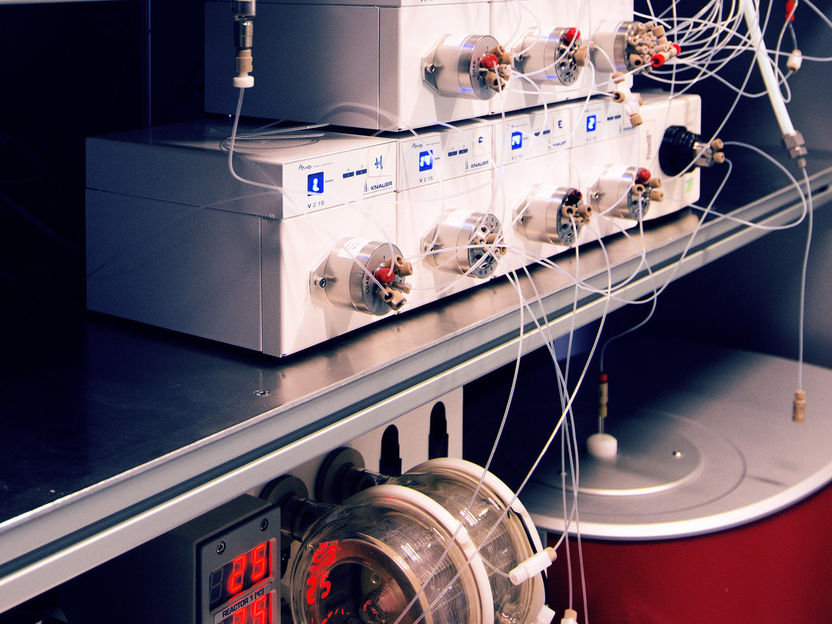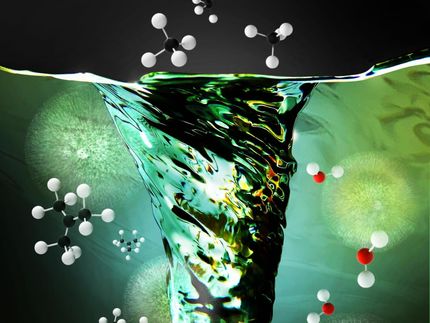A chemical factory for all cases
Radial synthesis breaks new ground for chemical research and production
In the future, bottlenecks in the supply of medicines could be more easily eliminated. An automated machine for radial synthesis developed by chemists at the Max Planck Institute of Colloids and Interfaces will enable the flexible production of medical agents and other chemical products. The apparatus can be quickly reprogrammed for the synthesis of various substances – even complex ones – without having to be modified. It can combine synthesis steps that previously required several devices. The device can also produce the materials remotely. The new technology also facilitates data-based developments in chemistry and could thus accelerate the search for new chemical products and reaction processes.

An all-purpose reactor: At the Max Planck Institute of Colloids and Interfaces, a team led by Kerry Gilmore and Peter Seeberger has developed an automated machine for radial synthesis. The heart of the reactor is the cylindrical container at the bottom of the picture - this is where the reactions take place.
© MPI for Colloids and Interfaces / Sourav Chatterjee
Chemical production is precision work. Whether medical agents or other chemical products, chemists must always individually design the manufacturing processes. They must also design the corresponding systems specifically for each product. This could be greatly facilitated with the automatic machine for radial synthesis – at least if a substance is not needed in huge quantities. “With radial synthesis, we are creating a paradigm shift in chemistry”, says Peter Seeberger. A team from the Director’s Department at the Max Planck Institute of Colloids and Interfaces helped develop the new approach to chemical synthesis.
Flexible access to substances
On one hand, the synthesis machine makes it possible to supply people in hard-to-reach places or in areas without a chemical industry with medical agents or other substances as required if they cannot be stored or transported there. This could be useful during unexpected shortages of active medical agents and provide people in developing countries with flexible access to substances, especially when the need cannot be foreseen. “The only bottleneck there could be in the availability of basic chemicals”, says Seeberger. “But with the raw materials at hand, this is a huge opportunity”.
On the other hand, the flexible synthesis machine opens up completely new perspectives for chemical research. After all, medical agents in particular often have a complicated structure. Minor differences can have major effects. In the search for the best substance, chemists usually synthesize many different molecules with slight variations. Until now, they have frequently had to change (or at least rebuild) their equipment. This entails time-consuming manual work. This also applies to the development of the optimal reaction pathways once the most effective molecule has been found.
Chemistry based on the model of Internet services
“With radial synthesis, we can largely eliminate manual work from chemistry”, says Seeberger. If he has his way, chemistry will soon be operated like Internet services: “You may be sitting in front of your computer, but the server on which an application is running is somewhere else in the world”, says Seeberger. Similarly, chemists may be able to control their experiments remotely. “This will allow us to test many more substances and reactions”, says Seeberger. “In this way, we can gather much more – and much more reliable – data”. This, in turn, could help big-data analysis in chemistry. “And ultimately, even an artificial intelligence that has developed chemical competence through training with the huge amounts of data could take over the search for potential new substances for a desired application or efficient reaction pathways”, says Seeberger. Chemists would then be able to devote their energy to tasks for which they cannot draw on experience and which therefore cannot be solved using data-driven methods.
The experimental scope is provided by radial synthesis because it combines two fundamentally different process techniques: cyclic and linear. Cyclic synthesis is the method of choice when chemists want to produce biopolymers such as proteins, carbohydrates, or strands of DNA. In doing so, they run a molecule in a cycle through a reaction vessel in which the same chemical reaction type takes place again and again so that the molecule gradually grows into a chain. Different elements can also be linked to the chain in the individual cycles. In linear synthesis, on the other hand, a molecule passes through several stations where different reactions take place in different apparatuses or at least in different parts of an apparatus.
Industrial companies have already expressed interest
The Potsdam researchers are now combining the two techniques by arranging several reactors for cyclic syntheses in a circle around a kind of turntable. This enables them to transport intermediate products remotely from one cyclic reactor to another and combine them with linear process steps. “We can flexibly combine different reactions – even fast and slow ones”, says Seeberger. Chemical conversions that take place at different speeds cannot be carried out efficiently in conventional linear chemical plants because the reaction mixture flows through them at a constant speed.
The Potsdam researchers will now further test the versatility of radial synthesis. They have already registered the technology as a patent, and the first industrial companies have already expressed interest. This is because the new synthesis machine can help them to drastically accelerate research into new products and their development. This would not only save costs but could also lead to more innovation.
Original publication
Other news from the department science
Most read news
More news from our other portals
See the theme worlds for related content
Topic world Synthesis
Chemical synthesis is at the heart of modern chemistry and enables the targeted production of molecules with specific properties. By combining starting materials in defined reaction conditions, chemists can create a wide range of compounds, from simple molecules to complex active ingredients.

Topic world Synthesis
Chemical synthesis is at the heart of modern chemistry and enables the targeted production of molecules with specific properties. By combining starting materials in defined reaction conditions, chemists can create a wide range of compounds, from simple molecules to complex active ingredients.






























































